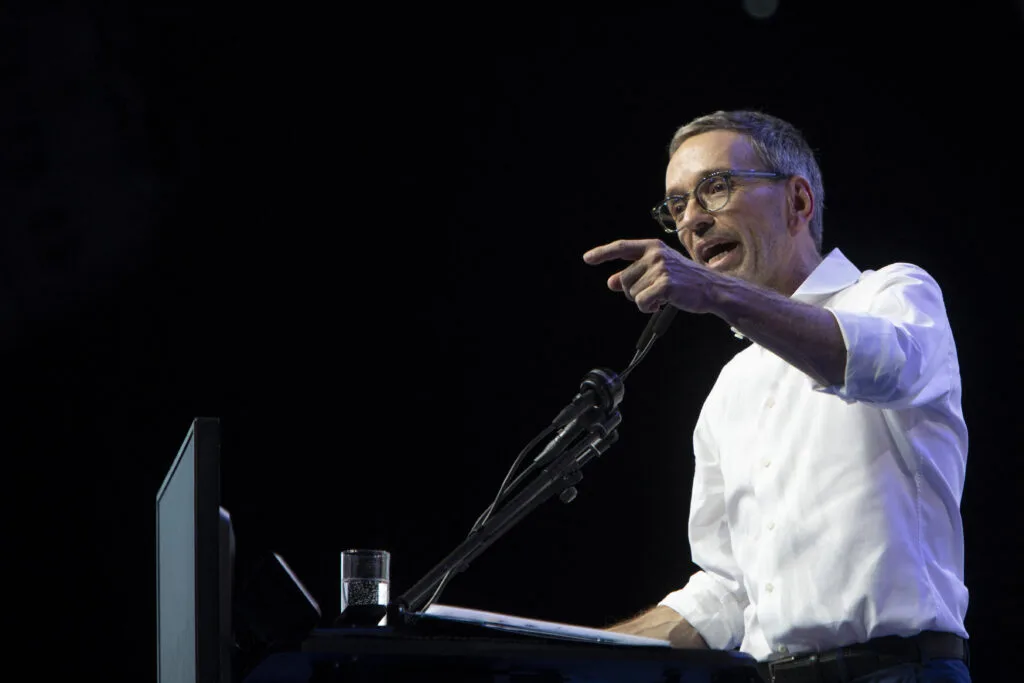Brussels – At last, the black wave has broken in Vienna. After the longest negotiations in its modern history, Austria finally has a government. It took the centrist parties five months to find the solution and put together a coalition that would exclude the post-Nazi far right, which came first in last September’s elections. The new executive’s program includes, among other things, fiscal consolidation and tightening on immigration.
After intense negotiations, the main centrist parties—the Populars of the ÖVP, the Social Democrats of the SPÖ and the liberals of Neos—have agreed to form the transalpine republic’s first three-way coalition since the post-World War II era. An executive that stemmed mainly from the need to restore the cordon sanitaire around the Freedom Party (FPÖ) of Herbert Kickl, keeping him out of the control rooms.
The far-right formation, born in the 1950s from the ashes of Nazism (former members of the SS were the founders), is characterized by an euroskeptic, pro-Russian and anti-immigrant rhetoric. In Strasbourg it is allied with the Lega, Fidesz and the Rassemblement national in the Patriots for Europe (PfE) group. Surprisingly, the FPÖ had come out first in last September’s elections with almost 29 per cent support, an unprecedented result since the end of World War II.

During a joint press conference this morning (Feb. 27), the leaders of the three prospective executive partners—the popular Christian Stocker, the social democrat Andreas Babler, and the liberal Beate Meinl-Reisinger—listed the main points of their government contract. However, the Neos base has yet to formally approve it (a vote, which must pass with a qualified two-thirds majority of the membership, is scheduled for March 2).
Stocker praised the culture of consensus and compromise that has characterized Austria’s post-World War II trajectory, calling it “the key to making bold decisions for the future” and hoping that this new form of three-way collaboration will bring “new ideas, new solutions, and new cooperation.” If nothing unexpected happens, the new government is expected to take office on Monday (March 3).
The shared program includes measures to reduce Vienna’s budget deficit and bring it back within the 3 per cent limit to avoid an infringement procedure from Brussels. There is also talk of increasing taxes on banks and extending taxes on extra-profits of fossil fuel producers, but also eliminating the VAT exemption on solar panels. A cut in public spending should also come from reforming the pension system. As for the management of migration flows (a hot topic on which the far right capitalised during the election campaign), ÖVP, SPÖ and Neos have promised a tightening of family reunification policies for refugees.
In times of great challenge, Austria has always gained its strength from the consensus of balancing forces. It was precisely this consensus that characterized the coalition of the People’s Party and the Social Democrats. In the decisive moments of our republic, they have proven that consensus… pic.twitter.com/GANLFjZJ4e
– Christian Stocker (@_CStocker) February 27, 2025
Never since World War II had it taken so long to form an executive in Austria. It took five months for the Nationalrat (the lower house of the legislature) to put together a coalition. In the aftermath of the vote, the three centrist parties had sat down at the negotiating table to exclude the FPÖ from the government area. However, the negotiations had foundered in early January when the Liberals pulled out, scuppering the deal.
At that point, President of the Republic Alexander Van der Bellen had instructed Kickl to test the waters and try to assemble a majority with the ÖVP. But, quoting the thirst for personal power from the FPÖ leader, by February the Populars had pulled the plug on dialogue with the radical right (with whom they had also previously governed, in 2000 and 2017).
Kickl branded the three-party alliance as a “coalition of losers,” calling for new elections. According to polls, today the Fpö would take 34 per cent. Criticism has also come from Leghist allies, who denounce yet another ploy: “The left defeated at the polls maintains power with palace agreements,” the European delegation of the Lega complains in a note, where they do not even spare jabs at the Populars who “perform the miracle of resurrecting the losing Socialists.”
English version by the Translation Service of Withub





